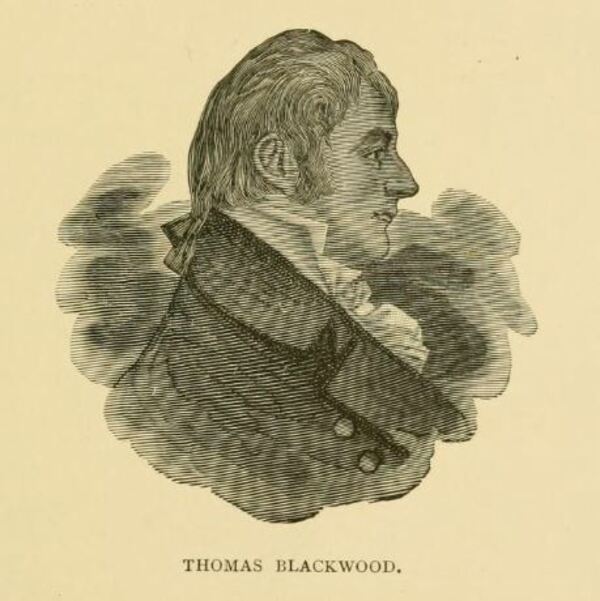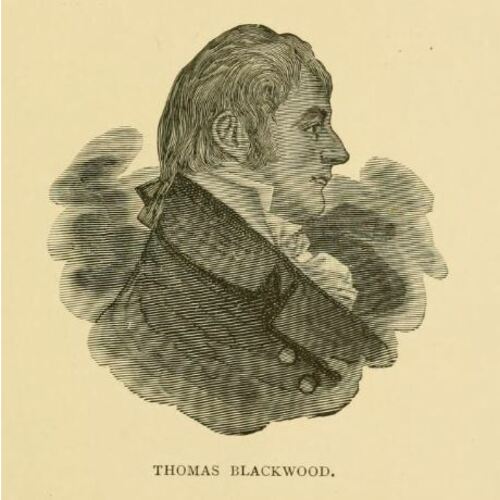
Source: Link
BLACKWOOD, THOMAS, merchant, militia officer, office holder, and jp; b. 10 Feb. 1773 in Lanarkshire, Scotland; d. 22 Nov. 1842 in Montreal.
Thomas Blackwood came to Quebec in May 1790 and was employed there until about 1795 by John Blackwood*, who is said not to have been a relative. In 1798 Thomas worked with James McGill* in establishing a French royalist colony at Windham, Upper Canada, under Joseph-Geneviève de Puisaye*, Comte de Puisaye. Two years later he joined McGill’s Montreal firm of James and Andrew McGill and Company. He was at Michilimackinac (Mackinac Island, Mich.) representing the firm’s interests in June and July 1806 and 1807. His letters from there give many details of the operation of early 19th-century Great Lakes trading and show that he had responsibility for considerable amounts of money and goods. In Montreal he dined often in Joseph Frobisher*’s circle of acquaintances, and on 27 Dec. 1806 Frobisher attended his wedding to Margaret Grant, the eldest daughter of John Grant of Lachine. Blackwood and his wife would have two children.
In 1810, following the dissolution of James and Andrew McGill and Company, Blackwood, François Desrivières* (McGill’s stepson), and Peter Harkness formed Desrivières, Blackwood and Company. James McGill died in 1813, leaving to Blackwood £500 and an exemption from any share in the debt of McGill’s late firm. Before 1815 Blackwood also partnered his brother John, trading in grain and lumber. In 1822 Thomas was among the merchants who established the Committee of Trade in Montreal [see John Richardson*], and he served as its first chairman until 1825. He was a director of the Montreal Savings Bank and its secretary-treasurer for a number of years from 1819. Soon after 1827 he failed in business, and he never regained his former prosperity.
Like most prominent merchants, Blackwood was active in Montreal’s social and public life. By 1804 he was an ensign in Montreal’s 1st Militia Battalion, and he may have served in 1812–13 as a lieutenant of artillery in the Montreal Incorporated Volunteers. He was promoted captain in the 1st Militia Battalion in 1821. In 1807 he had joined 20 other Scots in founding the Montreal Curling Club, the oldest in North America. The club’s first president, he held the post again in 1815–16, 1822–23, 1829–30, and 1831–32. He was made a charter director of the Montreal General Hospital, founded in 1819 [see William Caldwell*], received a commission of the peace in 1821, and in 1824 was named an examiner of candidates for the position of inspector of pot and pearl ashes and one of five commissioners to report on the state of the Montreal harbour.
From his arrival in Montreal, Blackwood had taken a major interest in the Scotch Presbyterian Church, later known as St Gabriel Street Church. From 1808 he served often on the temporal committee and was elected its chairman annually from 1819 to 1822. He was ordained an elder in 1819 and appointed clerk of session in 1832. From 1834 he was the congregation’s representative elder at all meetings of presbytery and synod. He was particularly active in seeking for Church of Scotland congregations in the Canadas privileges similar to those accorded to congregations of the Church of England. In 1828, when Archdeacon John Strachan* of York (Toronto) was pressing exclusive Anglican claims to the clergy reserves, Blackwood made public a letter Strachan had written to him in 1802 enquiring about the position of minister to the Scotch Presbyterian congregation. In 1836 he published a letter to the General Assembly of the Church of Scotland, arguing against “the false, unfounded assumption that the Church of England is the Established Church in all the British Dominions, Scotland alone excepted.” Two years later, in Remarks and observations on the constitution of the Canadas, civil and ecclesiastical, he contended that the Church of Scotland and a few other denominations had equal claim to the rights and privileges enjoyed by the Church of England.
In this pamphlet, published anonymously and distributed only to those “upon whose opinions and decisions the settlement of Canadian affairs may be considered chiefly to depend,” Blackwood discussed the causes of and possible remedies for the current political difficulties in Lower Canada. Like such conservatives as Herman Witsius Ryland and Robert-Anne d’Estimauville*, he believed the root of the problem to be a slavish attempt by the Patriote party to make the colonial constitution a replica of the British, which had evolved through centuries to suit the British people and could fit a colony only after alteration. To solve the crisis in the Canadas he advocated a legislative union. English would be imposed as much as possible in the legislature and the courts, but he did not envisage assimilation of the Canadians. Their language should not “fall into disuse or be discouraged” more than necessary and “the free and secure exercise of their religion,” not mere toleration, should be granted. Given security in their language and religion, he asserted, the Canadians would form a rampart against disloyalty and religious fanaticism introduced by “unprincipled adventurers” from Britain and, especially, the United States.
Blackwood died four years after publication of the Remarks. In an obituary in November 1842 the Montreal Gazette said that during his 47 years in Montreal Blackwood had acquired “the esteem and respect of all who knew him, consisting . . . of a very large portion of the community.”
Thomas Blackwood is the “Layman of the Church of Scotland” who wrote Remarks and observations on the constitution of the Canadas, civil and ecclesiastical; with a view to its amendment . . . (Montreal, 1838).
A portrait of Blackwood is in the Royal Montreal Curling Club and a silhouette appears in Campbell, Hist. of Scotch Presbyterian Church, on the plate facing p.244; a second silhouette is reproduced on p.2 of E. A. Collard’s study, cited below.
McGill Univ. Arch., MG 1007, James McGill will. McGill Univ. Libraries, Dept. of Rare Books and Special Coll., ms coll., MS430, MS433, MS435. PAC, RG 4, A1, 232, 361, 403, 476; RG 68, General index, 1651–1841: 60, 186, 349. Montreal Gazette, 27 Nov. 1842. Quebec Gazette, 13 May 1790; 13 Feb. 1794; 25 July 1799; 16 Dec. 1802; 15 May 1806; 3 May 1810; 6 Sept. 1819; 24 May, 5 June, 25 Oct. 1821; 27 March 1824. Montreal directory, 1819. Officers of British forces in Canada (Irving). Quebec almanac, 1805: 47; 1821: 102. E. A. Collard, The Montreal Board of Trade, 1822–1972: a story ([Montreal], 1972), 1–7. Creighton, Empire of St. Lawrence. Semi-centennial report of the Montreal Board of Trade, sketches of the growth of the city of Montreal from its foundation . . . (Montreal, 1893).
Cite This Article
Stanley B. Frost, “BLACKWOOD, THOMAS,” in Dictionary of Canadian Biography, vol. 7, University of Toronto/Université Laval, 2003–, accessed December 22, 2025, https://www.biographi.ca/en/bio/blackwood_thomas_7E.html.
The citation above shows the format for footnotes and endnotes according to the Chicago manual of style (16th edition). Information to be used in other citation formats:
| Permalink: | https://www.biographi.ca/en/bio/blackwood_thomas_7E.html |
| Author of Article: | Stanley B. Frost |
| Title of Article: | BLACKWOOD, THOMAS |
| Publication Name: | Dictionary of Canadian Biography, vol. 7 |
| Publisher: | University of Toronto/Université Laval |
| Year of publication: | 1988 |
| Year of revision: | 1988 |
| Access Date: | December 22, 2025 |



